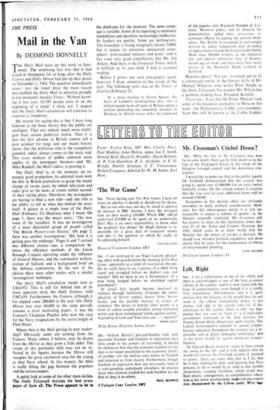THE PRESS
Mail in the Van
By DESMOND DONNELLY
HE Daily Mail went up this week to four- ' pence. The surprising fact was that it had stayed at threepence for so long, after the Daily Express and Daily Mirror had put up their prices on November 1, 1964. The question immediately arises: was the lower price the main reason that enabled the Daily Mail to advertise proudly in last weekend's Sunday Times: 'Without know- ing it last year, 63,789 people were in on the beginning of a trend.' I think not. I suspect that the Daily Mail's circulation will continue to improve at fourpence.
My reason for saying this is that I have long believed in the basic theory that the public are intelligent. They are, indeed, much more intelli- gent than certain publicists realise. Thus it is that the best ad-man in Britain cannot sell a poor product for long; and our recent history shows that the politician who is the compulsive gimmick addict always comes to the nasty end. This same analysis of public common sense applies to the newspaper business—and Mr. Mike Randall, the Mail's editor, is proving it.
The Daily Mail• is, at the moment,- an ex- tremely good production. Its editorial team were the first in British journalism to grasp the major change of recent years, by which television and radio give us the news of events within seconds of their taking place. Therefore, the newspapers are having to find a new role—and one role is the ability to tell us what lies behind the news itself. A glance at a single issue of the Daily Mail (February 21) illustrates what I mean. On page 1, there was the major story: 'The new voice of the racialists.' It was an investigation of a most distasteful group of people called 'The British Preservation Society.' On page 2, there was another investigation: 'Oil, how it is getting past the embargo.' Pages 6 and 7 carried two different stories—one, a comparison be- tween the efficiency methods of the Luton Borough Council operating under the influence of General Motors, and the ramshackle welfare- statism of Salford; and a background brief on the defence controversy. In the rest of the edition there were other stories with a similar 'investigation' technique.
The Daily Mail's circulation stands now at 2,463,972. This is still far behind that of its main apparent rival, the Daily Express, with 3,987,439. Furthermore, the Express, although it has slipped some 200,000 in the year (the Daily Mirror lost over 60,000 in the same period), remains a most interesting paper: it was the Express's Chapman Pincher who won the race for the Navy resignations by the entire length of Fleet Street.
Where then is the Mail getting its new reader- ship? Obviously some are coming from the Express. Many others, I belieie, may be drawn from the Mirror as they grow a little older. The extent of this particular shift may not be re- flected in the figures because the Mirror still occupies the great catchment area for the young as they leave school. In this respect, the Mail is really filling the gap between the populars and the serious papers.
A quick look at some of the other main dailies. The Daily Telegraph remains the best news- paper of them all. The Times appears to be as the doldrums for the moment. The news cover- age is variable. Some of its reporting is extremely tendentious and therefore increasingly ineffective. Its leaders are patchy. Some are perfunctory. The Guardian is losing marginally (down 7,000), but it retains its attractive amateurish atmo- sphere—polo-necked sweaters and jeans—and it has some very good contributors, like Mr. Ian Aitken. And there is the Financial Times, which is brilliant in its own field. I find it essential reading.
Before I praise our own newspapers again, however, I draw attention to the scoop of the year. The following story was in the Times of Zambia (February 2): At a mass meeting in Sloane Square. the heart of London's working-class arca, over a million people from all parts of Britain signed a petition demanding the immediate invasion of Rhodesia by British forces under the command of the popular idol, President Nyerere of Tan- zania. Mounted police, sent to disperse- the demonstration, defied their aristocratic re- actionary officers by signing the petition them- selves. The British Government is increasingly worried by public indignation over its policy of appeasement towards the Fascist leader Smith. More than 500,000 workers in the industrial city and nuclear submarine base of Bourne- mouth -ace on strike and there have been many arrests in the Haywards Heath coalfield in Scotland.
Heavens above! Not yet—it turned out to be a solemnised reprint of the literary skills of Mr. Michael Wharton, who writes Peter Simple in the Daily Telegraph. No wonder Mr. Wilson has a problem holding back President Kaunda.
Postscript.—I see that the Prime Minister took some of his favourite journalists to Moscow this week—the Parliamentary Lobby correspondents. Soon they will be known as the Lobby Fodder.


































 Previous page
Previous page